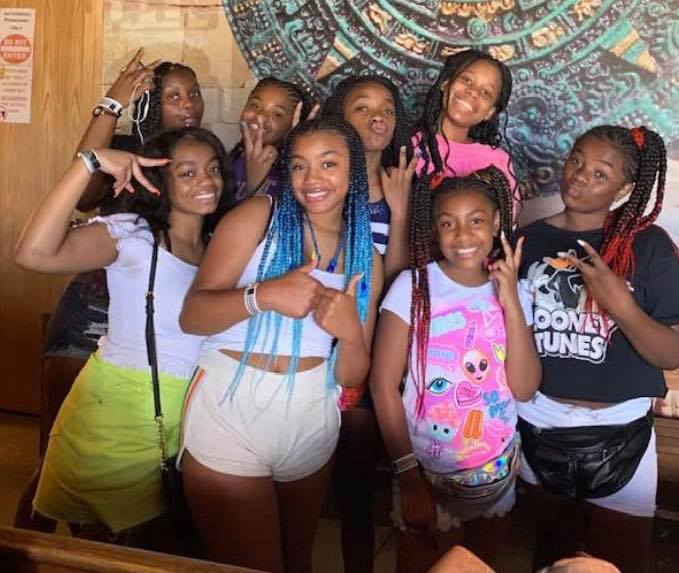By Howard Dukes
South Bend Tribune, Ind.
WWR Article Summary (tl;dr) As the daughter of a black father and a Mexican mother Ericka Thomas often struggled with her bi-racial identity and issues related to her appearance. It ultimately inspired her to create, “All Mixed Up”, a business that focuses on braiding the hair of biracial girls.
SOUTH BEND
Ericka Thomas grew up hearing family members have two different reactions to her hair.
Thomas, 31, is the child of a black father and a Mexican mother, and responses she heard from relatives on both sides of her family reflected deeply held beliefs that many people within and outside the black community have about idealized standards of beauty.
The Supreme Court struck down laws banning interracial marriage in 1967, and public acceptance of interracial families has steadily grown.
According to a 2017 Pew Research Center poll, only 10% of Americans would oppose someone in their family marrying a person of a different race. The Pew study also revealed that 14% of infants born in 2017 were either multi-racial or multi-ethnic.
Still, many biracial children struggle with questions of identity while growing up in a country still coming to grips with its complex and painful racial history. Thomas notes that those struggles often center around issues of appearance and that is why she opened All Mixed Up, a business that focuses on braiding the hair of biracial girls.
Her clients include Lexi Lipsey, 15, a student at Adams High School. She also gives advice to parents, including Lexi’s mom, Carrie Lipsey.
Carrie Lipsey said that she learned about All Mixed Up after seeing an online posting.
“I was looking for someone who could help me learn how to do braids,” she said. Two of the things that Lipsey liked about Thomas are that the styles were age appropriate, and that she and Lexi could maintain the braids between appointments.
The Lipseys are the kind of clients Thomas hoped to reach in June when she started All Mixed Up, located in the Mary Crest Building, 2015 W. Western Ave., in South Bend. She knew that some parents felt lost and intimidated when going into beauty shops and supply stores in black neighborhoods and that the hair care products used by white women were often ineffective.
More importantly, Thomas knew that many of her clients need to talk to someone who also struggles with the same questions of identity. Thomas understands.
“My little girls are always so timid,” she said. “They don’t know where they fit in.”
Thomas was raised by her mother on South Bend’s west side in a demographically diverse neighborhood.
“On the Mexican side, they would always say that I had bad hair,” she recalled. Thomas’ hair is black, wavy and long, and her mother struggled to control it.
“My mom always said that I had bad hair, so I started thinking that I have this terrible hair. This thick hair.’
“It’s not Mexican, so it must be black people’s hair.”
Thomas got a different reaction from black family members, friends and beauticians.
“They were saying the opposite,” Thomas said. “‘You have good hair. Why is your mom always trying to put a relaxer in your hair?'”
However, even their seemingly positive reaction had an unsettling side, Thomas recalled. Thomas sought help at beauty shops and beauty supply stores, but was sometimes met with indifference.
She had to learn.
“I’ve been braiding hair since I was 9 years old,” she said. “My mom said she couldn’t do nothing else with my hair, so I had to figure it out.”
One of her black friends braided, and she took the time to braid Thomas’ hair.
“When she braided my hair,” Thomas recalled, “I would literally sit there and feel how she was braiding.”
Thomas went home and practiced on her Barbie deluxe styling head doll.
She eventually graduated to braiding her mother’s hair, as well as her friends.
“It got to the point,” she said, “where I would do their hair every week for school.”
Thomas has two daughters, Diamond, 12 and Erianna, 3, and people have often complimented her on how well she braids Diamond’s hair. People offered to pay Thomas to braid their hair or their children’s hair, but she never seriously considered starting a business until spring of 2019 when she thought about all the conversations she had with the parents of biracial children.
“I have an older sister on my father’s side who is also a beautician, and I sat down with her and let her know my idea,” Thomas said.
Braiding will be a big part of what Thomas does, but she’s still developing the vision for her business.
“I have a lot of ideas of what I want to do and I’m open to whatever,” she said. “If they just want to come in and talk, I’m open to that.”
Lexi takes advantage of the open chair, happily accepting the hairstyles and the life advice.
“The first time she did my hair we talked about basketball and we talked about the problems of being mixed and having curly hair,” Lexi said.
Lexi said that Thomas helped her by giving her a response to classmates who question her identity.
“She said that if you run into a situation like that you have to take it into your own hands and say they don’t know what they’re talking about,” Lexi said.
Thomas said she wants her clients to know that they don’t have to prove anything to anyone.
“It doesn’t matter how black or white you are,” she said. “You are unique and that’s OK.”
___
Distributed by Tribune Content Agency, LLC.














































































































































































































































































































































































